#best platform to sell online courses
Explore tagged Tumblr posts
Text
How to Develop a MOOC Platform
Developing a MOOC Platform requires careful planning and execution. Begin by outlining your target audience, course offerings, and desired features. Next, select a robust technology stack and design an intuitive user interface. Incorporate features for content creation, student engagement, assessments, and analytics. Ensure scalability and security measures to accommodate a large user base. Integrate social learning tools and community features to foster interaction among learners. Finally, continuously iterate and improve based on user feedback and emerging trends. With dedication and strategic development, your MOOC platform can become a dynamic hub for online learning.

0 notes
Text
AITribes Professional by Ben Murray and Karthik Ramani Review
AITribes Professional by Ben Murray and Karthik Ramani – Auto-build Next Generation Sites that Sell Products and Courses, Generate Leads, and Build Fans Hands-free with AI. AITribes Professional by Ben Murray and Karthik Ramani. Easy Customization & Site Setup, Pick from a variety of site customization options like colors, fonts, domain names, unique images and banners, and more to customize your…
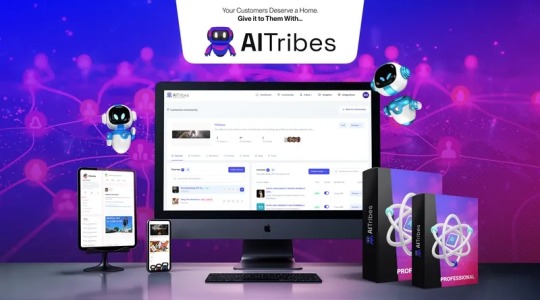
View On WordPress
#AI automation for community building#AI-powered community management tools#All-in-one community management solution#Best practices for user engagement in online communities#Customizable templates for community platforms#Email marketing for online communities#Gamification to boost member participation#How to monetize online communities#Private messaging features in community platforms#Selling courses through community platforms
0 notes
Text
Substack Mastery Book: Chapter 14
How to Add Interactive Educational Programs Using One of the 6 Globally Recognized Tools to Inform, Educate, Inspire, and Retain Your Subscribers Dear Beta Readers, Thank you for your feedback so far. You honor my content on multiple platforms. I understand this chapter may seem quite technical to beginners, as I designed it to benefit advanced freelance writers and content entrepreneurs who…
#Advanced Writing Tips#Best-Selling Substack Mastery Book#Content Entrepreneur Resources#content entrepreneurs#Course Creation Tools#Digital Product Creation#Email Marketing Platforms#freelance writers#freelance writing#Freelance Writing Tools#Grow your Substack newsletters with online courses#Growth Strategies for Freelancers#Landing Page Strategies#Online Business Scaling#Sales Funnel Optimization#stories#Substack Mastery book by Dr Mehmet Yildiz#Using Online Courses for Substack Growth#writers#writing#writingcommunity
0 notes
Text
Explore the best stock trading courses and premier trading education in USA at TradersHub. Elevate your trading skills with our innovative approach. Start your journey to success today with our comprehensive online trading courses.
#trading courses#trading courses online#trading courses in usa#stock trading education#best stock trading courses online#best trading courses online#best trading education#trading education websites#trading courses near me#online trading tools#Trading Platform in usa#Financial Markets#trading courses for beginners#Advanced trading courses#best price action trading course#best indicator for option trading buy and sell#Trading pricing plans in USA#best Subscription options for traders#Pricing for trading courses#Trading services cost
1 note
·
View note
Text
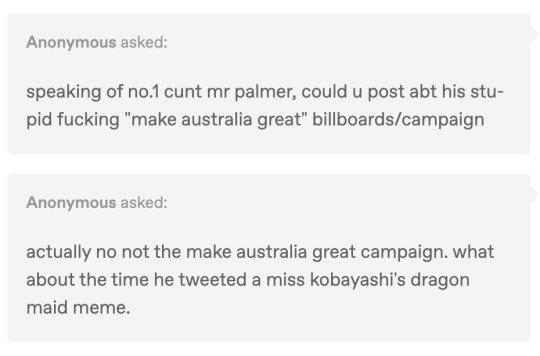

So a bit of background first for our international followers: Clive Palmer is one of Australia's many mining billionaires who like to meddle in our country's politics, and as such he is utterly despised by all of Australia.
Picture for context:

He is most commonly known online by the title "Fatty McFuckhead", (problematic as it may be) because he tried to sue a youtuber for $500,000 for calling him that - and he lost. So the name stuck.

Up until his most recent foray into parliament, the legally certified Fuckhead was best known for his batshit business ventures, such as attempting to build "The Titanic 2" (failed) and trying to build a dinosaur theme park (also failed, but at least nobody got eaten by a T-Rex in this one).
For a very long time Clive played the role of sugar daddy to Australia's largest conservative party, the ironically named Liberal Party, until they had a falling out in 2012 after Clive claimed there was too much money influencing politics (lol), at which point he started his own party, days after saying he totally quit and wasn't fired and he only left because he didn't want to be a distraction.
His initial run at parliament was actually kinda successful, with Palmer's group winning 4 seats, plus a member from the "Motoring Enthusiasts Party" joined them too after accidentally getting elected and not knowing what the fuck to do.
Despite this initial success however, Palmer's party (which ran on basically no platform other than "I'm rich") hit an iceberg (titanic 2 achieved) and seven elected state and federal politicians quit within the first year.

By the time the next federal election rolled around, only one Palmer party candidate was still running for re-election. The most successful of this group - Jaquie Lambie - quit to sit as an independant and is still in parliament today.
Here she is with a painting of herself strangling Clive (she sells signed copies of this)

And here the senator is posting about liking sausage:

Anyway, we're getting to the point: which is the yellow posters. By the 2016 election, just two years after forming, the party was in complete freefall. It won just 0.01% of the vote at their second election, and it was announced shortly after that Clive was quitting politics and the party was being shut down. Australia breathed a sigh of relief.
It was, of course, short lived.
Clive, in desperate need of attention, restarted the party for the 2019 election, fielding candidates in every seat and spending $60 million in advertising in an attempt to win votes.
Every single candidate lost.
It was in this campaign however that Australia really started to fall out of love with Palmer, because most of that $60 million went towards putting up the world's least compelling marketing billboards on almost every single free space in the country.
For a good six months this was basically the only thing you would see in Australia if you went outside:

Clearly Graphic design is his passion. And yes, the genius did just straight up try and copy Trump's homework while changing a few words, hoping nobody would notice.
Very quickly these all got vandalised and it seemed the ad companies didn't care enough to replace them.



We could go on posting examples, there are thousands, but the best is definitely the one Ikea put up shortly after Clive lost the election:

In 2022, Clive's party contested the election AGAIN, this time also opting to send millions on spam text messages to every person in Australia begging for people to vote for him, as well as buying almost every youtube ad for a year, at the cost of $100 million.
He won a whopping one seat.
During this election Clive ran on an anti-lockdown, anti-vax platform with the slogan "freedom, freedom, freedom". That message, however, was slightly undermined when his goons, dressed in 'Freedom!' shirts, made national news for trying to beat up a protester who turned up at a rally dressed as an annoying text message, shouting "pay your workers" at Clive.

As if that wasn't bad enough, at another rally Clive knocked himself unconscious while trying to jump up on stage, and then a few weeks later was rushed to hospital with covid, while his anti-vax ads were still in regular rotation on TV, at which point it was also leaked to the press that Palmer had been alledgedly trying to buy Hitler's car.
Utterly humiliated, the party deregistered again shortly after the election.
Can't wait until he runs again in 2025.
Anyway, on the other "Clive tweeting Miss Kobayashi's Dragon" thing, we have no idea what that means but here's a screencap:
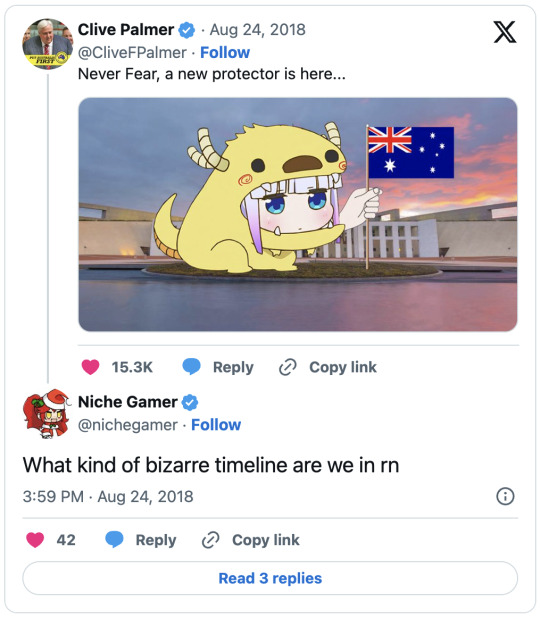
5K notes
·
View notes
Text
15 Best Online Course Platforms For 2023 (Comparison)
15 Best Online Course Platforms For 2023 (Comparison)
Thinkific – Best online course platform overall. Extremely popular and boasts a significant feature set. 100% focused on online courses. Affordable + free plan available. Podia – Best all-in-one platform. Sell courses, and more. Includes affiliate marketing, email marketing, customer messaging, etc. Great for beginners. Affordable + free plan available. LearnWorlds – Powerful course platform…

View On WordPress
#best online course platform#best online course platforms#create an online course#create online course#how to create an online course#how to create an online course step by step#how to create an online course that sells#how to sell an online course#online course#online course creation#online course creation tools#online course marketing#online course platform#online course platforms#online course platforms comparison#online courses
0 notes
Text
★ how to maximize profits via 2nd house ★

aries in the 2nd house can maximize profits by capitalizing on their entrepreneurial drive and competitive spirit. aries benefits from fast-paced, high-energy ventures where they can lead and make quick decisions. they might excel by launching a fitness training program, offering personal coaching services, or starting a motivational brand that sells products like athletic apparel, energy drinks, or performance gear. aries could also find success with subscription boxes focused on high-adrenaline hobbies like hiking, martial arts, or adventure sports. by embracing ventures that allow them to innovate quickly and take the lead, aries can build profitable businesses that leverage their passion and high energy.

taurus in the 2nd house is well-suited for steady financial growth through high-quality, long-term investments and products. they thrive in businesses that emphasize luxury, beauty, and quality, such as a high-end skincare line, organic foods business, or eco-friendly clothing brand. taurus could also consider starting a boutique furniture store that sells artisan-crafted or vintage items, as they appreciate products with enduring value. with their talent for creating a comforting atmosphere, taurus might excel with a bed and breakfast, a spa, or a wellness center that offers relaxation services. taurus maximizes profits by focusing on products that prioritize quality and offer a luxurious experience, appealing to clients who value longevity and craftsmanship.

gemini in the 2nd house can boost profits by tapping into their adaptability and communication skills, especially in diverse, mentally stimulating fields. they could thrive by starting a digital marketing agency, offering copywriting or editing services, or launching an online course platform that covers a wide range of topics to cater to curious minds. with their natural social skills, gemini could also excel in creating a networking app or social media consulting service. offering services like translation, podcasting, or even freelance journalism can keep income flowing, as gemini is well-suited to manage multiple streams of revenue. their knack for curiosity-driven ventures and networking makes them ideal for businesses that involve idea-sharing, quick adaptability, and community engagement.

cancer in the 2nd house can increase earnings by focusing on nurturing and emotionally resonant businesses that bring comfort to others. they might start a home-cooked meal delivery service, a childcare center, or a family-focused event planning service that organizes intimate gatherings like birthdays and reunions. cancer could also do well in real estate, particularly with home staging or property management that emphasizes creating warm, inviting spaces. they could excel in interior decorating, especially with a focus on cozy, family-oriented spaces, or start a handcrafted candle or blanket line. by building businesses that revolve around care, comfort, and family, cancer can create loyal clients and establish long-term success through emotional connections.

leo in the 2nd house maximizes profits by showcasing their creativity and leadership, often excelling in businesses that allow them to stand out and build a brand. leo could find success with a personal brand consultancy, fashion line, or luxury event planning business. they might enjoy launching a social media channel focused on lifestyle or self-improvement, where they can attract sponsorships or sell branded merchandise. leo also thrives in roles where they can influence and inspire others, so they might consider starting a motivational speaking business, an acting or dance academy, or a high-end boutique. with their flair for self-expression, leo profits best when they create high-quality, visually captivating products and services that let their star power shine through.

virgo in the 2nd house finds financial success through practical, detail-oriented services that provide high value and efficiency. they excel in businesses that involve organization, health, and precision, such as financial consulting, tax preparation, or a personal organizing service. virgo might also thrive with a nutrition or wellness coaching business, offering tailored health plans or holistic products like herbal supplements or self-care kits. a digital bookkeeping service, copyediting business, or virtual assistant agency could also bring them steady profits, as virgo’s meticulous nature appeals to clients who seek reliability and structure. by focusing on services that emphasize quality and organization, virgo builds a reputation for excellence that attracts a steady client base.

libra in the 2nd house can increase earnings by leveraging their skills in diplomacy, aesthetics, and partnerships. they could start a wedding planning business, a floral design company, or a luxury lifestyle brand that sells carefully curated home décor items. libra would also excel in public relations consulting or brand management roles, where they can help clients present a refined, balanced image. creating a high-end art gallery, a boutique law firm, or a relationship coaching service could also align well with libra’s skills. libra thrives in partnership-focused ventures, so building collaborative business models or co-founding a business with others can also enhance their profitability and bring a sense of harmony to their financial life.

scorpio in the 2nd house maximizes profits by tapping into their ability to handle intensity and complexity, often succeeding in fields like finance, psychology, and research. scorpio could build wealth by creating a private investigation firm, a psychotherapy practice, or a financial planning service specializing in wealth management or estate planning. they might also thrive in real estate investment, particularly with properties that need transformation, such as flipping houses or managing rental properties. scorpio may also excel in businesses related to holistic healing, offering reiki or shadow work coaching. by focusing on industries that require trust, depth, and resilience, scorpio can attract clients who value privacy and are willing to invest in transformational services.

sagittarius in the 2nd house can increase profits by embracing their love for adventure, growth, and education. they could launch a travel agency specializing in unique cultural experiences, a language learning platform, or a motivational speaking business that offers courses and workshops. sagittarius could also thrive by creating a publishing company focused on philosophical or inspirational content or starting a tour guiding business for international destinations. their enthusiasm for knowledge makes them great at teaching, so they might consider offering online courses or starting a coaching business in a field they’re passionate about. by aligning with growth-oriented ventures, sagittarius can attract an audience that values inspiration and big-picture thinking.

capricorn in the 2nd house maximizes profits through disciplined, long-term planning and a practical approach to business. they’re well-suited for businesses like a corporate consulting firm, project management agency, or investment portfolio service. capricorn could also do well in real estate development, particularly with rental properties or commercial buildings. they might find success by starting a financial advisory firm or creating a luxury goods company focused on high-end, timeless products like leather goods or fine jewelry. by aligning with industries that reward patience and professionalism, capricorn can build a solid financial foundation and enjoy steady growth, often seeing long-term success through conservative but reliable investments.

aquarius in the 2nd house can increase profits by focusing on innovation, technology, and humanitarian ventures. they might launch a tech startup, a renewable energy company, or a social media platform that prioritizes community and ethical interaction. aquarius could also find success with a nonprofit organization focused on social justice, an eco-friendly product line, or a collaborative workspace for creatives and freelancers. their futuristic mindset makes them perfect for ventures in artificial intelligence, blockchain technology, or virtual reality. by aligning their finances with progressive and forward-thinking industries, aquarius can attract clients and customers who value innovation and social impact.

pisces in the 2nd house maximizes profits by leaning into their creativity, compassion, and spirituality. they may thrive in a music or art therapy practice, a spiritual coaching business, or a holistic wellness center that offers services like yoga, meditation, and crystal healing. pisces could also succeed by creating a boutique art studio, a dream journal line, or a subscription service for wellness products like essential oils, herbal teas, and calming rituals. they’re drawn to businesses that help others heal or connect with their inner selves, so they may also find success in fields like astrology, psychic readings, or intuitive counseling. by aligning with businesses that emphasize emotional well-being and creativity, pisces can build a profitable venture that resonates deeply with clients who seek personal and spiritual growth.

809 notes
·
View notes
Text
yeah so if you genuinely don't know how to write an email instead of using chatgpt and getting something that 1: has a chance to just fucking suck (and potentially be noticeably AI) and 2: uses stolen content, ruins the environment and indicates to the gen-AI companies that you want more gen-AI bullshit that will steal things and ruin the environment, you can look up how to write an email or look up email examples. here's a website, here's another, here's the wikihow page (it's a bit shit but it does its job), here's a good one for formal emails, and here's an email I sent today (more examples under the cut):
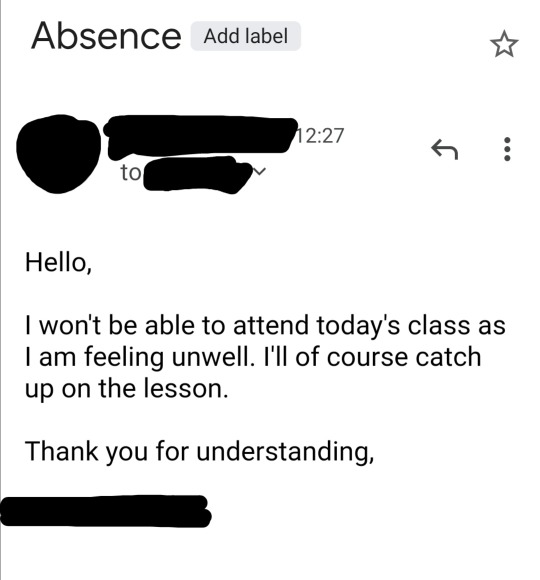
something that's really annoying right now is that most websites are desperately trying to sell you their cool funky AI friend that can write the email for you, and look at me: you have to tell it to go fuck itself (in your head, don't use it). this isn't about you being a moron for not being about to write an email, I struggled with it for a while too, I still do sometimes, writing emails notoriously sucks. gen-AI sucks more.
also, this might not be the case for everyone, but please at least try to learn how to write the email before using chatgpt, it will help you forever. if you have a question about emails or if you're not sure how to write one specific email, you can send an ask: I'm not all-knowing but I'll do my best to help.
I can mostly help for college/high school levels and I am studying in a French school, so the codes may not be exactly the same, but I am in fact being taught by English speakers, sometimes native ones.
I'll give more general advice at the end, but here are a few examples of emails I would send.



If there's even a small chance of your teacher not recognizing you, write at the top something like "I am Name Last name, I am in your X-Y-Z class on Mondays from 8AM to 9AM". This isn't too useful in high school because your teachers likely know you, but in college your teachers might not. This will give them context.
Do your best to avoid typos or grammar errors. Reread your email, especially if the teacher is a language teacher.
Be polite, always, unless the teacher explicitly specified they don't care.
You do not need to beg for anything, don't debase yourself, and if a teacher makes you debase yourself, report them. You shouldn't have to beg for something that you ask for in an email. (so no more than one please per email, and avoid this one please if possible).
If it's possible and safe for you, prefer discussing important matters IRL.
Remember who you're talking to. Is the teacher strict or chill? Younger or older? Are they a white abled man or a Black disabled woman? Are they very into "respect the teacher!!" or do they put themselves at your level? Are you a 15 y/o high school student or a 20 something college student? Is this teacher familiar with you? Have they been understanding in the past? etc.
Generally, despite all my warnings above, a simple polite email will be fine with most teachers. If you're not sure how to identify the above possibilities or how to alter your emails depending on them, just write a formal, polite email (like seen above).
Some universities have online courses that teach you how to write emails. If there is a web-type course in your university and you can take it, take it.
Mine has one. I hate it. They defined a tweet as a "post on a blogging platform". I have to complete it or I don't pass. It still has a good tutorial for writing emails. You are lucky in the sense that emails are like the basic thing that even the boomer teachers know how to do (even if they don't like doing it), so there are a lot of resources for people who haven't written emails yet and need to learn.
If possible, ask your teacher at the start of the year what email to contact them with - if you're lucky, they'll say things about what kinds of emails they want.
If you're lucky still, someone else will send a shit email and the teacher will make a point during the class to remind how to write a proper email.
I put "Dear name" everywhere, but if it's not an extremely formal setting, some teachers will be fine with a "Hello". If you're not sure of the receiver's gender, use their title (Dr. etc).
For the extension: sometimes teachers aren't allowed to give you an extension or are assholes who don't want to give you an extension. In that case, don't bother writing another email (again: don't beg. + it will make them dislike you which you don't want).
This works more in work settings, but I read once that it's good to say "I will be taking a day off" rather than "May I take a day off/is it possible to take a day off". Just say that it's going to happen.
Know your rights. I can't know them for you. Figure out what the teacher can and cannot do through legal documents on your school's website or whatever. Know your rights depending on your state or country.
If you have a bad memory and don't want to have to look up how to write an email everytime, open your notes app or your blocknote or any preferred place to take notes and write down the important. I'd advise to note common greetings, subjects, opening and closing lines. Same for your teachers, if you need to remember which one is a bitch and which one is chill, write their name down with a description.
#people who know how to write emails. I'm calling you. post email examples lmao#like if you have time to make a guide or to compile examples. do it#mumblings//#emails#how to write an email#chatgpt#(if you're a tech bro and you see this: do not bother I will block you)
46 notes
·
View notes
Text
Pose Reference Resources
I promised Dia (aka aerequets) that I will make a collection of pose references in the reply of one of her art posts, and then I completely forgot about it. Until now. I'm sorry for my bad memory.
So, yeah, better late than never I guess?
The pose collection I use the most is no longer free. They used to let you download a whole album (more than 8GB worth of data) to use offline, but now you have to pay $40/package or $200 for full sets. I still have the zip file for a very old version of theirs, but I can't legally share it. So, let's skip to the other options.
1/ First, you heard of those 3D dolls program that let you model your own reference pose? This one is an online one and for free, the whole ordeal. Of course since it's online and free, you can't save your model for next time, and it costs quite a lot of time to set the model up. So, you should take as much screenshots in as many tricky angles as you need once you done with the setting. Best using for complicated scenes where those below don't have what you need already available.
2/ This one is free and in 3D, you can rotate the model to any angle that you need. The only set back is the numbers of poses are quite limited. This one is best for using as a basic blocks then build up what you want to draw, or just as a practice to improve your understanding of human anatomy.
3/ This one is free for personal uses and the pose collection is massive. The setbacks are the language barrier (it's in Japanese, English is sometimes tag-a-long) and you have to search through their pages for what you need. The pics for each pose is static but they are in different angle in almost 360 degrees. There are many 2-person and 3-person poses too. Great for illustration inspiration.
4/ This one will only show reference photos of human head, at whatever angle you rotate the model. The web interface is easy to use. There are options like searching based on gender, ages, emotions, glasses, facial hair or not, etc. Good for practicing face drawing.
5/ This one will show reference photos for human body parts, at whatever angle you rotate the model, read the instructions for how to do it. The web interface is quite hard to use at first, just tinkering around for a bit, and you will be fine. There are options like searching based on gender and which particular parts that you need refs for. Good for that moment when you go "huh? how is this <body part> will look in this <situation>????"
6/ This one will only show reference photos of animal heads, and only the head, at whatever angle you rotate the model. The accurate skull refencence list is their best point. There are enough common species in the drop down list. Tbh, I don't use this much because I often need refs for the whole animal most of the time. But it's best for furry artists, I guess?
7/ Real model photos. They sell pose reference in themed packs, but there are enough free packs to use as drawing practice too.
8/ This is the best for general background reference. Lots of options. Not really good for very specific location results, but good for random background in drawings.
9/ Lastly, for specific objects or background references at strange angles, I often search for 3D models on this site then take screenshots of whatever I need.
That's all, folks. Hope this list can help ease some of the struggles that we will encounter on our quest of learning the art of drawing things 😂
302 notes
·
View notes
Note
Hi, I'm trying to do art commissions, but no one has commissioned me yet. Do you have any advice for attracting customers?
I wrote a lot of words for you in hopes that at least some of it will be helpful, so I'm putting the bulk of this answer below a read more to save people the scrolling. The quick and easy two tips that I find people forget to do the most are:
Is your art easy to find? Having a pinned post with a tag for your art, a link in your bio, or an art-focused / reblog-light blog (like this one!) make it so that people know you draw, and knowing you've been posting art for a while makes you less likely to be a scammer.
Is your commission info easy to find? People can't buy things that they don't know you're selling; clear and accessible links to your prices and terms are important.
Now for the real bulky meat of advice giving, where I say a lot of words that may or may not be relevant:
I have a lot of advice, but I do want to say before getting into it:
A lot of selling art (especially in a non-industry setting, like with social media commissions) is luck.
There is no one size fits all method for selling art, and it's best to go with what feels right to you (I'll go more into this later)
Tips for selling are not necessarily tips for creating, and there will be advice in here that I don't apply to myself. Determining what you do and do not implement is something you should decide for yourself and your work flow.
Your art not selling doesn't mean nobody cares about it.
Personally I think the idea of intentionally curating a single subject demographic of Customer and Consumer for your work is limiting and doomed to burnout in a non-industry space. I will also touch more on this later.
Now for the rest of it in varying orders:
✨ Attracting Customers
This one is going first because you mentioned it specifically. It is kind of vague though, by nature of the term, so what I advise doing is specifying.
When you are thinking of a customer, are you trying to appeal to:
People who will buy pre-made art products? (Pins, stickers, prints, etc)
People who will buy custom work? (Commissions for specific subject matter)
People who will buy art resources you've created? (Fonts, bases, texture packs, 3d models etc)
There's also frequency: a repeat customer of custom art will usually be appealed to more by a wide range of options (like illustrations), while you might get more single-purchase customers if you only offer a limited range of options (like only icons).
Demographics also, of course, play a substantial role in just custom art commissions; furries get lauded as high spenders, but they're also a huge community that is focused around OCs, so by statistics alone they will have more people with spending money and will be frequent customers of people drawing OCs. A narrower audience means fewer people, but often the spread of the people within that audience is the same - and at the end of the day, selling an art piece only requires one other person, it's just a matter of happening to find them.
The follow up question is of course the finding: the average artist in fandom spaces selling commissions does not have the platform or budget for an ad campaign. This, however, is also its own category:
✨ Posting Online
Right out the gate: anyone who has told you that just drawing x thing is the way to get easy money is wrong.
"If you draw more fan art, you'll -" wrong.
"Nobody cares about that, you should be drawing this instead -" wrong.
"if you need to sell fast, just sell porn -" wrong. And also re-evaluate your perceived lack of quality or value about the subject.
The things you will be able to create easily and consistently will be the things YOU, SPECIFICALLY, like to create. It is also entirely impossible that you are the only person on earth to have ever liked those things, which means that if you create them, there are people out there who will enjoy them.
It feels itchy to be like "and those people are Potential Customers", but it is true; your work will resonate with people. They will want you to create it. It is vitally important to your own well being that the things you create, that you want others to enjoy, are things you enjoy as well.
(This is also why the "just draw porn" joking advice that gets tossed around is particularly fucked up. You as the artist should not feel forced into drawing things you aren't comfortable with, and the vast majority of customers for explicit content also don't want the people making it to feel forced into doing so. It's basic consent. I have strong feelings about this.)
If you are creating things and putting them out into the world, they will find an audience. That audience may be one singular person! The number does not matter, because that's still a person who - again, sucks to frame ig this way - has the potential to buy things from you.
If you're constantly chasing a bigger follower count, more interactions, etc etc for the future, it can genuinely be pretty taxing on the people who want to support you in the present. When you enjoy someone's work, and want to support them, being told constantly that that support is not good enough is frustrating. Trying to follow your work should not lead to seeing more "likes are WORTHLESS and NOBODY reblogs my things" posts than it does art. You are a person making things to share with other people, and you have to remember it or you will burn yourself out into a desiccated husk.
TL:DR consistency is key and the easiest way to be consistent is to just draw whatever the fuck you live drawing in whatever ways you want to draw it, and then slap it on the internet somewhere and Keep Doing That
✨ The Actual Commission Information
this one is just factual really. A lot of artists have really shitty commission sheet layouts, because advertising graphic design and illustrative art are different skill sets. That's fine. You don't have to remake the wheel. A good commission sheet should include:
More images than text (if you can't see what the examples are when zoomed out, you have to rearrange or cut down on words)
Examples organized by price / type, and clearly labeled
Your personal favourites for examples - one really strong example piece is better than twenty tiny images of work you think is just "okay"
Contact information - having a method that works WITHOUT a social media account (email.) Is important and way easier to keep organized, imo
A SIMPLE list of strengths (the things you draw the best) and things you won't draw (common example: mechs). You do not need to list every fandom or subject matter. Limit yourself to a top five.
A clear and easy to type link for your terms of service. Carrd, and sites like it, is good for this. This will go into details about your process, what you will and won't do, permissions granted to the commissioner (like "no, you can't make an NFT with this"), your privacy policy (saying you won't sell commissioner details to third parties), and other stuff. You do not want to have all of this on your original post, because it should be thorough and you want your main post to be showcasing your work and not your legalese. Here's mine as a reference; if you have trouble writing your own, feel free to copy from it and make the necessary alterations for your work.
✨ There Was More I Was Going To Write But I Forgot
I have a different document of commission related talk here, which is also incomplete but in a different way. It's in my nature. Hopefully some combination of this and that can be useful to you. Sorry if they're not. I love you have a nice day
78 notes
·
View notes
Text
the beginner's guide to making money by investing in stocks (hot girl version)
since one of my goals here is to make money i wanted to teach you about what i know about investing in stocks. i use the website etoro to invest, below you can see a picture of my portfolio at the moment. i am by no means an expert but i've found the whole process of investing to be unnecessarily mystified so i thought i'd share what i have learned so far.
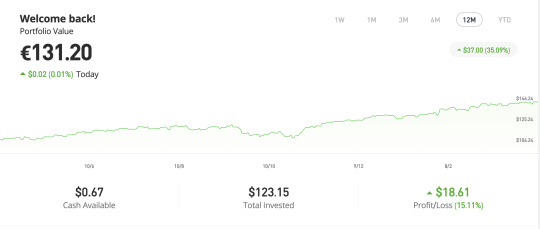
what does buying stocks mean?
in simple terms, buying stocks means buying a (tiny) fraction of a company. if the value of the company increases the value of your share goes up, if the company loses money the value goes down.
when should i buy and sell?
ideally, you should buy when you think that the value of a stock will increase in the future and you should sell when you have made a profit. in practice, this means you try to invest when a stock has reached its lowest value and you sell when you think it has reached its peak (but this is, of course, impossible to predict perfectly).
where can i buy stocks?
i would personally recommend going through an online stock trading platform, like etoro. you can look up what the best stock trading platforms are for your country. you should pick one with minimal fees that offers some tutorial or introduction to trading.
you can also go through a stock broker (a person that makes the investments for you) or more broadly your bank - be aware though, that they might take a cut of your profit for their services which is something you need to subtract from your expected profit.
how do i know what to invest in?
There are a few recommendations that I have seen time and time again:
ETFs - exchange-traded funds are bundles of stocks that are traded together. the advantage of ETFs is that they don't rely on a single company making a profit, the companies just need to make a profit overall. they are much less volatile than individual stocks and since economies usually always grow in the long-term, you are very likely to make a profit.
large companies - you can also invest in large, well-established companies that are very likely to make a profit and very unlikely to go bankrupt (e.g., apple, amazon, etc.)
diversify - this means you should invest in a wide variety of companies and industries. even when one of them does really poorly you are likely to make a profit overall.
copy-trading - this means 'copying' the investments of a more experienced trader. so you specify an amount of money and invest it the same way someone who knows what they're doing is.
how much should i invest?
most websites have a minimum amount you need to invest so you could start with that to get a feel for how it works.
as a rule of thumb, they say you should not invest money that you will need within the next 5-10 years. that rule prevents you from having to sell your stock at an unfortunate moment - even if you initially write losses, you can wait for a moment when your stocks have increased in value again.
if you have a fixed income you can commit to investing a part of your income every month. i've seen this referred to as dollar-cost averaging and i have not tried it yet but it is said to be a good way to build wealth in the long term.
how do i actually make money using this knowledge?
simple answer: by selling your stock at the right time and withdrawing the money. investing is a marathon, not a sprint - you should generally give your money some time to make a profit instead of checking every day and panic selling when you see a slight change. for some stocks, the company may also pay dividends. disclaimer: at least where i am from you need to declare what you made from stocks as income and pay taxes on it.
thank you so much for reading!
if you have questions or know more about this and want to add something please leave a comment 💕
#financial freedom#law of assumption#stock trading#financial empowerment#financial education#neville goddard#manifesting money#manifestation#rich girl
53 notes
·
View notes
Text
How to Maximize Your Learning with the Best Online E-learning Platforms Provider

Online learning has rapidly transformed the education landscape, providing students and educators with a wealth of resources and opportunities. With the rise of elearning, traditional classroom settings have expanded beyond physical boundaries, allowing students to access educational materials and interact with instructors from anywhere in the world. This blog delves into the transformative power of the best online e-learning platforms provider, highlighting their pivotal role in maximizing learning potential.
Join us as we explore the myriad benefits these platforms offer, providing insights into how they can shape a more flexible, interactive, and globally connected educational experience. Discover the keys to unlocking your learning potential with the best online e-learning platforms provider.
Benefits of Online Learning Platforms for Schools
Online learning platforms offer numerous advantages for schools, fostering a more dynamic and engaging learning environment.
Flexibility for Students: Online learning platforms bring a heightened level of flexibility to education, allowing students to tailor their learning experience to their own pace and preferred environment. Whether at home, on the move, or in a traditional classroom setting, students can seamlessly access course materials and engage in interactive activities at their convenience.
Enhanced Teaching Tools: These platforms empower educators by offering a diverse set of tools to augment teaching methods. With features such as multimedia presentations, virtual simulations, and interactive quizzes, online learning platforms cater to various learning styles, fostering active participation. Teachers can leverage these tools to craft more engaging lessons that meet the unique needs of their students.
Global Accessibility: The online nature of these platforms breaks down geographical barriers, enabling students and educators to connect from anywhere in the world. This global accessibility expands educational opportunities and promotes a rich exchange of ideas on a global scale.
The Power of E-learning in Unlocking Learning Potential
One of the most significant advantages of online learning platforms for schools is their ability to unlock students' learning potential. By providing access to a vast array of educational resources, these platforms enable students to explore topics in depth and broaden their knowledge beyond the confines of traditional textbooks.
Furthermore, online learning platforms often incorporate gamification elements, such as badges and leaderboard rankings, which can motivate students to actively engage with the material and strive for excellence.
Moreover, online learning platforms have the potential to foster a sense of community and collaboration among students. Through discussion forums and group projects, learners can connect with their peers, exchange ideas, and learn from different perspectives.
This interactive approach not only enhances students' understanding of the subject matter but also cultivates essential skills such as communication, teamwork, and critical thinking.
Conclusion
In conclusion, online elearning platforms have revolutionized education, providing schools with powerful tools to enhance teaching and unlock students' learning potential. The flexibility, interactivity, and collaborative features offered by these platforms create a dynamic learning environment that caters to diverse student needs.
By carefully selecting the best online e-learning platforms provider, schools can embrace the transformative power of online learning and set their students on a path to success.
Discover Lectful, the best e-learning platforms provider for your school and unleash your students' learning potential today!
#best platform to sell online courses#Selling an online course#Websites to sell online courses#Free course building platform#Online mooc platforms#Software to create online courses
0 notes
Text
Two principles to protect internet users from decaying platforms

Today (May 10), I’m in VANCOUVER for a keynote at the Open Source Summit and later a book event for Red Team Blues at Heritage Hall; on Thurs (May 11), I’m in CALGARY for Wordfest.
Internet platforms have reached end-stage enshittification, where they claw back the goodies they once used to lure in end-users and business customers, trying to walk a tightrope in which there’s just enough value left to keep you locked in, but no more. It’s ugly out there.
If you’d like an essay-formatted version of this post to read or share, here’s a link to it on pluralistic.net, my surveillance-free, ad-free, tracker-free blog:
https://pluralistic.net/2023/05/10/soft-landings/#e2e-r2e
When the platforms took off — using a mix of predatory pricing, catch-and-kill acquisitions and anti-competitive mergers — they seemed unstoppable. Mark Zuckerberg became the unelected social media czar-for-life for billions of users. Youtube was viewed as the final stage of online video. Twitter seemed a bedrock of public discussion and an essential source for journalists.
During that era, the primary focus for reformers, regulators and politicians was on improving these giant platforms — demanding that they spend hundreds of millions on algorithmic filters, or billions on moderators. Implicit in these ideas was that the platforms would be an eternal fact of life, and the most important thing was to tame them and make them as benign as possible.
That’s still a laudable goal. We need better platforms, though filters don’t work, and human moderation has severe scaling limits and poses significant labor issues. But as the platforms hungrily devour their seed corn, shrinking and curdling, it’s time to turn our focus to helping users leave platforms with a minimum of pain. That is, it’s time to start thinking about how to make platforms fail well, as well as making them work well.
This week, I published a article setting out two proposals for better platform failure on EFF’s Deeplinks blog: “As Platforms Decay, Let’s Put Users First”:
https://www.eff.org/deeplinks/2023/04/platforms-decay-lets-put-users-first
The first of these proposals is end-to-end. This is the internet’s founding principle: service providers should strive to deliver data from willing senders to willing receivers as efficiently and reliably as possible. This is the principle that separates the internet from earlier systems, like cable TV or the telephone system, where the service owners decided what information users received and under what circumstances.
The end-to-end principle is a bedrock of internet design, the key principle behind Net Neutrality and (of course) end-to-end-encryption. But when it comes to platforms, end-to-end is nowhere in sight. The fact that you follow someone on social media does not guarantee that you’ll see their updates. The fact that you searched for a specific product or merchant doesn’t guarantee that platforms like Ebay or Amazon or Google will show you the best match for your query. The fact that you hoisted someone’s email out of your spam folder doesn’t guarantee that you will see the next message they send you.
An end-to-end rule would create an obligation on platforms to put the communications of willing senders and willing receivers ahead of the money they can make by selling “advertising” in search priority, or charging media companies and performers to “boost” their posts to reach their own subscribers. It would address the real political speech issues of spamfiltering the solicited messages we asked our elected reps to send us. In other words, it would take the most anti-user platform policies off the table, even as the tech giants jettison the last pretense that platforms serve their users, rather than their owners:
https://pluralistic.net/2022/12/10/e2e/#the-censors-pen
The second proposal is for a right-to-exit: an obligation on tech companies to facilitate users’ departure from their platforms. For social media, that would mean adopting Mastodon-style standards for exporting your follower/followee list and importing it to a rival service when you want to go. This solves the collective action problem that shackles users to a service — you and your friends all hate the service, but you like each other, and you can’t agree on where to go or when to leave, so you all stay:
https://pluralistic.net/2022/12/19/better-failure/#let-my-tweeters-go
For audiences and creators who are locked to bad platforms with DRM — the encryption scheme that makes it impossible for you to break up with Amazon or other giants without throwing away your media — right to exit would oblige platforms to help rightsholders and audiences communicate with one another, so creators would be able to verify who their customers are, and give them download codes for other services.
Both these proposals have two specific virtues: they are easy to administer, and they are cheap to implement.
Take end-to-end: it’s easy to verify whether a platform reliably delivers messages from to all your followers. It’s easy to verify whether Amazon or Google search puts an exact match for your query at the top of the search results. Unlike complex, ambitious rules like “prevent online harassment,” end-to-end has an easy, bright-line test. An “end harassment” rule would be great, but pulling it off requires a crisp definition of “harassment.” It requires a finding of whether a given user’s conduct meets that definition. It requires a determination as to whether the platform did all it reasonably could to prevent harassment. These fact-intensive questions can take months or years to resolve.
Same goes for right-to-exit. It’s easy to determine whether a platform will make it easy for you to leave. You don’t need to convince a regulator to depose the platform’s engineers to find out whether they’ve configured their servers to make this work, you can just see for yourself. If a platform claims it has given you the data you need to hop to a rival and you dispute it, a regulator doesn’t have to verify your claims — they can just tell the platform to resend the data.
Administratibility is important, but so is cost of compliance. Many of the rules proposed for making platforms better are incredibly expensive to implement. For example, the EU’s rule requiring mandatory copyright filters for user-generated content has a pricetag starting in the hundreds of millions — small wonder that Google and Facebook supported this proposal. They know no one else can afford to comply with a rule like this, and buying their way to permanent dominance, without the threat of being disrupted by new offerings, is a sweet deal.
But complying with an end-to-end rule requires less engineering than breaking end-to-end. Services start by reliably delivering messages between willing senders and receivers, then they do extra engineering work to selectively break this, in order to extract payments from platform users. For small platform operators — say, volunteers or co-ops running Mastodon servers — this rule requires no additional expenditures.
Likewise for complying with right-to-exit; this is already present in open federated media protocols. A requirement for platforms to add right-to-exit is a requirement to implement an open standard, one that already has reference code and documentation. It’s not free by any means — scaling up reference implementations to the scale of large platforms is a big engineering challenge — but it’s a progressive tax, with the largest platforms bearing the largest costs.
Both of these proposals put control where it belongs: with users, not platform operators. They impose discipline on Big Tech by forcing them to compete in a market where users can easily slip from one service to the next, eluding attempts to lock them in and enshittify them.


Catch me on tour with Red Team Blues in Vancouver, Calgary, Toronto, DC, Gaithersburg, Oxford, Hay, Manchester, Nottingham, London, and Berlin!


[Image ID: A giant robot hand holding a monkey-wrench. A tiny, distressed human figure is attempting - unsuccessfully - to grab the wrench away.]

Image: EFF https://www.eff.org/files/banner_library/competition_robot.png
CC BY 3.0 https://creativecommons.org/licenses/by/3.0/us/
89 notes
·
View notes
Text
Announcement: 2023 OFIC Press Prize
Submissions for the 2023 OFIC Press Prize are OPEN until 11:59pm EST on June 1, 2023.
The OFIC Press Prize will be awarded to up to 2 novels and up to 3-4 novellas, which will be published in 2024. The prize for a novel is $1000 and a novella $250. Novels will be published as standalone books and novellas will be compiled into an anthology.
We're looking for manuscripts that don't really fit in a traditional publishing category, maybe because they're too romance-y for general or literary fiction, and not romance-y enough for romance. Or maybe there's just a truly tasteless amount of smut. What we value most is an earnest portrayal of character, interesting relationship dynamics, and well-crafted prose that prioritizes clarity and voice.
We can guarantee the winners their prize money, thorough editorial feedback, professional cover design, and digital publication. We plan to run a Kickstarter to fund a physical print and distribution. Should our Kickstarter succeed, you'll also receive 10 copies of your book/anthology. We'll do a print of 100 copies to sell in our online store in addition to the number of Kickstarter contributors.
Rules & Restrictions:
Novellas can be 12,000 to 50,000 words; novels are over 50,000. While we have no upper limit, know that anything over 150k is going to be a really hard sell. We're not opposed, though. If it slaps, it slaps.
Must be written in English.
Author must be 18 or older to submit.
Your work cannot be published or posted anywhere else. If you’ve posted a work on any social platform, even if you take it down, for legal reasons, we cannot accept it. This means you can’t delete a work from AO3 and file off the serial numbers to send to us.
Your work must stand on its own as an original piece, although we of course welcome common fanfiction tropes (or the subversion thereof), and works that feel fanfiction-y but contain original characters and worlds. Again, legal reasons.
We can't publish song lyrics (either within the manuscript or in the title) unless they're public domain.
Manuscript Formatting:
Please provide the following as front matter of your manuscript:
A title page with your contact info. Your AO3 handle/social media can go here if you're comfortable sharing that, as well as if you'd like to publish under a pseud or pen name.
A cover letter with a brief fan history. You can share however much or little you'd like to share, but we're mostly looking for your relationship to fandom and fanfiction: how long you've been in fandom, what fandoms you've been in, community events you've participated in, things like that. If you don't know what "in fandom" means, this is not the press for you.
A synopsis of the story. This doesn't have to be fancy or professional-sounding. In fact the closer it sounds to a tumblr shitpost, the better. Pretend your best friend has just asked, "So what's your book about?" The synopsis would be the long answer/tea spill that follows. It should include all major plot beats (even if that involves major spoilers). No page limit, but it shouldn't be super long, up to 5ish pages, preferably 1-2.
You can format it however you like as long as the font is readable, preferably 12pt Times New Roman or Garamond. Please provide page numbers in the footer of the document. Double-spaced preferred with one inch indentation at the start of paragraphs.
If you have questions or would like clarification on any of the above, email [email protected] or send us an ask. We’re excited to read your work!
site | subscribe | submit | faq
115 notes
·
View notes
Text
Boost Your Career: Enroll in Online Courses Today google ads
Introduction

Key Components of Google Ads
Keywords:
These are the words or phrases that ability customers search for while looking for products or services. Businesses use keywords to target their advertisements to relevant audiences.
Ad Groups:
Ad businesses are collections of related commercials and keywords. This allows to prepare your campaigns and improve concentrated on.
Ads:
These are the text or image-primarily based advertisements that seem on Google Search results pages or on websites in the Google Display Network.
Bidding:
This is the procedure of placing a most bid for each keyword. The better your bid, the much more likely your ad is to seem on the pinnacle of the quest results web page.
Quality Score:
This is a metric that measures the relevance and great of your advertisements and touchdown pages. A better excellent score can result in lower charges and better ad performance.
Types of Google Ads Campaigns
Search Network Campaigns:
These campaigns goal users who're actively attempting to find services or products the use of specific keywords.
Display Network Campaigns:
These campaigns target customers primarily based on their pursuits, demographics, and browsing behavior.
Video Campaigns:
These campaigns target customers who are watching films on YouTube and different video platforms.
Shopping Campaigns:
These campaigns sell products at once from your online keep.
Creating a Google Ads Campaign
To create a Google Ads marketing campaign, you may need to comply with those steps:
Set up a Google Ads account:
Create a unfastened account and provide your billing information.
Choose a campaign type:
Select the kind of marketing campaign that first-rate suits your goals.
Set your finances:
Determine how a whole lot you need to spend for your campaign.
Target your target audience:
Use key phrases, demographics, and pastimes to target your commercials to the right people.
Create your ads:
Write compelling ad replica that includes your keywords and encourages clicks.
Monitor and optimize:
Regularly reveal your marketing campaign's overall performance and make adjustments as wanted.
Best Practices for Google Ads
Keyword Research:
Use key-word studies gear to identify relevant keywords in your commercial enterprise.
Ad Copy:
Write clean, concise, and compelling ad reproduction that includes your keywords.
Landing Pages:
Ensure that your landing pages are relevant to your ads and provide a extremely good person revel in.
A/B Testing:
Experiment with one-of-a-kind ad versions to see what works excellent.
Tracking and Analytics:
Use Google Analytics to song the performance of your campaigns and make facts-pushed selections.
3 notes
·
View notes
Text

All right, let me put this under a cut, because this doesn’t come up often, but I think I’d like a single post I can refer people to when this topic gets brought up.
Short version: I read all seven books and hated them, and now the author is an unapologetic transphobe, which is something I have no patience for. In recent years, critics have begun to connect the author’s neoliberal politics with a lot of the flaws in the writing, and this video by Shaun is a pretty good exploration of what was so frustrating about the books and the characters.
Long version: I “liveblogged” all seven Harry Potter novels between 2005 and 2012. I use the quote marks because back in those days I’m not sure “liveblog” was a term, but I certainly hadn’t heard of it. I called it a “review”, but I basically would read each chapter and recap the whole thing with my smartass commentary. In hindsight, this was probably more like me trying to do Nostalgia Critic’s bit in prose format, but I wasn’t very familiar with him at the time either.
Soon afterward, I moved my online presence to tumblr, which was sort of a fresh start for me. It sounds like I’m implying there was some sort of bad experience that came out of the whole thing, but there wasn’t. I was proud of the work I did at the time, and while I’m not sure if it holds up in the 2020′s, I got a lot of satisfaction out of finishing a multiyear project like that. But by the end, I was ready to move on, and so I have moved on, which is why I don’t speak of it much in this space.
The point I’m making here is that I read all the books and I examined them pretty thoroughly, and my conclusion was that they all sucked. Yes, even your favorite one. No, it didn’t start out good and jump the shark later on. They all sucked. That’s what I had against Harry Potter.
I say “had”, because even though I’ve moved on to other pursuits, J.K. Rowling continues to maintain a public presence, selling her video games and spin-off movies and so on. She’s also gone full-on TERF, spouting transphobic rhetoric and using her platform as a billionaire best-seller to bully people who are much less fortunate than herself.
I’ll embed that video I linked to up top.
youtube
I think Shaun does a really excellent job explaining just what bugged me so much about the Harry Potter books. I found the main characters extremely unlikeable, and I could never quite put my finger on the reason. And the villains were pretty weak too, despite all their terrible crimes and talk of conquest. Superficially, the whole thing feels like a classic good vs. evil struggle, with good wizards fighting bad wizards, kind of like how the Transformers are about good alien robots fighting a war against bad alien robots. But it never seemed to work in the Harry Potter books.
Shaun explains why: Despite the “good versus evil” premise, a lot of the good guys just act like thoughtless, selfish pricks sometimes, and it’s justified because they’re on the good guy team. Sometimes a character will do something terrible to another character, and it’s deemed acceptable because they’re nominally a “good guy”, and the person they’re being a jerk to is a “bad guy”, so they’re fair game. It’s less about “good vs. evil” and more about “us vs. them”.
Shaun doesn’t spent a lot of time getting into Rowling’s transphobia, but he does talk about a lot of the other problematic stuff in the books, like the lack of thought she put into Cho Chang’s name. He also points out the hypocrisy in having all the other characters act irritated with Hermione’s anti-slavery campaign. The whole thing with the house elves was half-baked from the start, and Rowling kept stumbling through each book trying to correct course, ultimately settling on having one character stand up for the Right Thing, only to have all the other characters ignore or dismiss her concerns. Harry himself seems to have no particular opinion on house-elf slavery, which sums up the character very succinctly. He’s the protagonist and the viewpoint character, but he doesn’t stand for anything in particular.
Now that I think about it, I suppose this was why I kept working anime characters and Transformers and professional wrestlers into my liveblog of the books. At the time, I would have told you I was just doing it to keep myself entertained as I trudged through the series, but in hindsight, I think I was just starved for characters who actually believed in something bigger than themselves. Harry can barely be arsed to do his own homework, meanwhile, I’ve known what passions fuel Omega Supreme since I was nine years old.

“Diction: Straighforward. Personality: Complex. (*snif*)”
I don’t know what sort of person you are, @endmylife69 . You strike me as a reply guy, contrarian for its own sake. I see feminist and antifeminist posts in your likes, and one of the three posts on your blog is about how much you hate Chi-Chi, so I don’t know why you even show up to my blog, where I think Chi-Chi is awesome. The point is if your agenda here is to sea-lion me into “proving” that Rowling is a TERF and that TERFs are bad, I’m not interested in playing that game. There’s plenty of critics out there who will walk you through that discussion step by step. You asked what my problem is with her, and I’m telling you.
There are fans of hers who have to struggle with the moral implications of liking her work while distancing themselves from her hateful beliefs. I respect the fans who have to figure that out. I don’t respect the fans who just pretend like the dilemma doesn’t exist, because they care more about playing that new Hogwarts vidya game than anything else.
For my own part, I can’t relate to the fans’ dilemma, because I always thought Rowling’s book series sucked shit. What’s frustrating for me is that I spent about seven years roasting her books on the internet, and the whole time I was going “Ha ha these books suck shit!”, and it all just feels so dated now, because she’s going to go down in history as this rich, hateful bigot. Her lousy writing is going to be a footnote to her career. It’s like writing an “epic takedown” of Mel Gibson movies without ever getting into all the antisemitic stuff he’s done. In retrospect, I feel kind of disgusted for engaging with her work at all, even to insult it.

I’m sick of talking about Harry Potter, so let me make this about Chi-Chi, since that seems to be the only thing I know you have strong opinions about. Part of the reason I like Chi-Chi so much is because she’s basically right. She objects to a lot of the things that happen in Dragon Ball, which makes her seem like a killjoy, but her motives are sensible and important. She grounds the other characters, keeping them with one foot in the real world.
This is because Chi-Chi understands that there’s more to life than fighting gonzo anime battles. Yes, she lives in a world where laser karate is real and quite prevalent. Yes, her sons are insanely powerful warriors who are sometimes the only thing standing in the way of world annihilation. But at the same time? Gohan and Goten really do need to study and get good jobs. Protecting the world is important, but so is family, and home life, and the work you do. Also, maybe it’s important to stop breaking the furniture all the time. Its expensive, dammit.
These are messages that a lot of DB fans don’t care for, because they tuned in for gonzo anime battles, and this loud woman is scolding everyone for wanting that. But the point of the character is that there’s a bigger world in the lore. There’s places to live and people to meet and things to do besides fighting Frieza all the time, and she wants her loved ones to thrive in that world, which is why she keeps reminding them of it.
And that’s a metaphor for our own world, where there’s more to our own lives than the shows we watch and the books we read, and the internet arguments we get into. We each have to ask ourselves what we stand for, what we’re trying to be on this planet. My problem with the Harry Potter franchise is that it doesn’t seem to stand for much of anything. The characters only seem to care about stopping big league threats, but have no interest in reforming their broken society. The protagonist spends much of his time just passively experiencing the story like he’s sitting in a theme park ride. The author only seems to feel strongly about punching down, attacking trans people and surrounding herself with anyone willing to congratulate her for this despicable attitude. Her supporters only seem to care about being on her side, no matter how morally bankrupt it is.
Like, okay, that video game came out a few months ago, and I saw people on Twitter trying to angrily justify their decision to buy it, even though a lot of people have pointed out that it directly supports a woman who uses her wealth to justify her bigotry platform. They’d go “It’s just a game!” and someone made a really snotty TikTok about it or something, and I’m like “Who are you trying to convince, me or yourself?” If it was just a game, then they’d just play it and not say anything. But they know it’s not just about the game, and that’s why they’re so defensive about it. They want to be on both sides of this thing, and that doesn’t surprise me much, since their favorite book series taught them that they can be a real selfish dickbag and still be a good guy as long as you oppose the main villain.
Chi-Chi would see right through that. It’s not enough to just oppose the final boss. It’s the life you live before and after those kinds of battles that defines you as a person.
Anyway, Harry Potter sucks rotten eggs, and the author is a giant toolshed. Also, that funeral they did for the giant spider was a fucking ordeal to read. 0/10 would not recommend.
46 notes
·
View notes